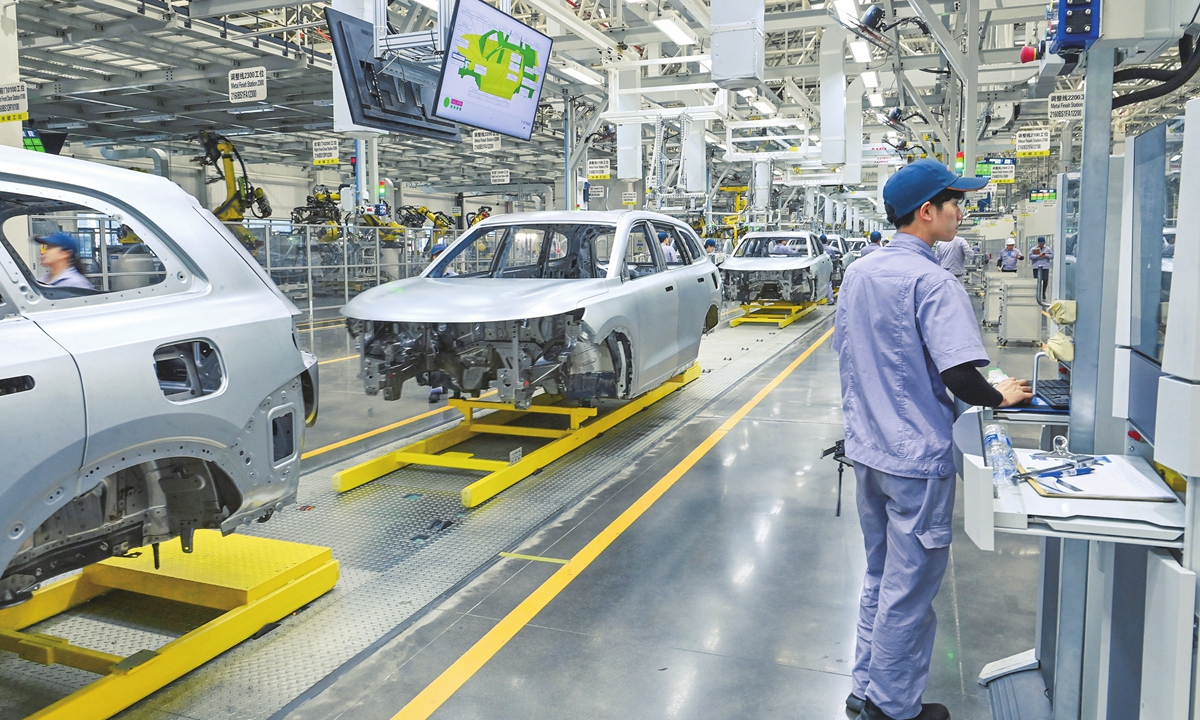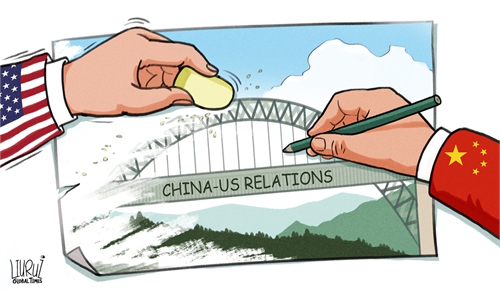Chinese Premier’s detailed response to overcapacity claims sends message of cooperation

The manufacturing line of a NEV factory in Southwest China's Chongqing Municipality Photo: VCG
Chinese Premier Li Qiang's detailed response to the so-called overcapacity claims made by some Western officials, in which he called for an objective view of capacity issues based on economic laws and from a global perspective, sent a signal that China seeks to address global issues through cooperation, rather than politicization, experts said on Friday.The premier's message of cooperation also underscored China's consistent approach toward global cooperation, even as Western officials have in recent years pushed for de-coupling or de-risking based on claims of national security concerns, experts noted.
On Tuesday, during talks with German Chancellor Olaf Scholz in Beijing, Li stressed that the issue of production capacity should start from economic laws and be viewed objectively and dialectically from a market viewpoint and a global perspective, the Xinhua News Agency reported.
From a market viewpoint, the amount of production capacity is determined by the relationship between supply and demand, and having production moderately greater than demand is conducive to full market competition and promoting the survival of the fittest in the market, Li said. From a global perspective, the production capacity of different countries is determined by their comparative advantages, Li added, according to Xinhua.
Li also stressed that China's new-energy industry has gained advantages through self-improvement and sufficient market competition, rather than by government subsidies. He expressed hope that the EU side will uphold market-oriented and fair principles, and prudently use trade remedy measures.
The remarks clearly show China's approach of addressing global challenges through cooperation, rather than politicization of economic and trade issues and protectionism, experts said.
"The remarks are aimed at urging all parties to tackle global challenges through cooperation, instead of looking at some issues from one's own self-interests," Zhou Mi, a senior research fellow at the Chinese Academy of International Trade and Economic Cooperation, told the Global Times on Friday, noting that the West's so-called overcapacity claims are not conducive to normal market development and free trade.
China has always adopted an approach of cooperation, while Western officials are promoting de-risking or decoupling. Notably, amid growing talks of "de-risking" in Europe, Li, during a visit to Germany in June 2023, also mounted a strong response. "We don't think it's risky to drive in a Volkswagen, nor do we think it's unsafe to get a CT by Siemens equipment. We never regard these as risks, and China never wants to 'de-risk' from them," Li said at the time.
In recent days, Western officials have been stepping up their accusations of "overcapacity" against China, specifically targeting China's new-energy industry. During his visit to China, Scholz "warned Chinese officials to address overcapacity and treat foreign firms better," Bloomberg reported, noting that the German Chancellor was echoing criticism delivered by US Treasury Secretary Janet Yellen last week.
This week, Yellen again repeated the overcapacity accusations and even warned that the US wouldn't take "anything off the table," including additional tariffs on cheap goods from China. Meanwhile, at a meeting of the China-US economic working group in Washington on Tuesday, the US side also claimed that it "continued to express concerns about China's non-market practices and industrial overcapacity."
However, the Western officials' accusation of overcapacity has been harshly criticized by economists both in China and abroad as defying economic laws.
Lü Xiang, a research fellow at the Chinese Academy of Social Sciences, told the Global Times that the groundless allegation of "overcapacity" by some US politicians defied economic rules, and it was aimed at providing a cover for US companies with backward capacity, such as those making internal combustion engine cars.
"Taking electric cars as an example, the current global capacity cannot meet the surging demand of the global transformation for new energy, and there is about 70-80 percent room for growth in the sector," said Lü.
According to estimates by the International Energy Agency, the global demand for new energy vehicles is projected to reach 45 million units by 2030, which is 4.5 times the figure from 2022. Similarly, the global demand for newly installed photovoltaic capacity is expected to reach 820 gigawatts by 2030, approximately four times the 2022 level, according to media reports. For solar panels, the demand for newly installed capacity will likely quadruple. These figures mean the current level of production capacity for new-energy products lags far behind demand.
The current production capacity falls far short of meeting this market demand, highlighting significant potential demand for new energy products in many developing countries, experts said.
The overcapacity accusation also puzzled some Western economists. Nicholas Lardy, a senior fellow at Washington DC-based think tank the Peterson Institute for International Economics, told Xinhua last week that the concept of excess capacity is "potentially harmful."
Lardy noted that there is no way of measuring overcapacity and the US' suggestion that no country should produce more of a product than could be sold domestically does not make sense.
"So Boeing should cut its production? US soybean farmers should limit their production to what can be sold within the United States? The US appears to have a comparative advantage in these products so why shouldn't Boeing and US farmers produce more than can be absorbed domestically, with the 'excess' exported?" he said.


